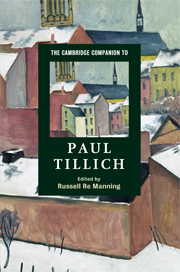Book contents
- Frontmatter
- Part I Standing within the theological circle
- Part II Theology of culture
- Part III Tillich in dialogue
- 14 Tillich in dialogue with natural science
- 15 Tillich in dialogue with psychology
- 16 Tillich in dialogue with Japanese Buddhism: a paradigmatic illustration of his approach to inter-religious conversation
- 17 Tillich and feminism
- 18 Tillich and the postmodern
- Bibliography
- Index
18 - Tillich and the postmodern
from Part III - Tillich in dialogue
Published online by Cambridge University Press: 28 May 2009
- Frontmatter
- Part I Standing within the theological circle
- Part II Theology of culture
- Part III Tillich in dialogue
- 14 Tillich in dialogue with natural science
- 15 Tillich in dialogue with psychology
- 16 Tillich in dialogue with Japanese Buddhism: a paradigmatic illustration of his approach to inter-religious conversation
- 17 Tillich and feminism
- 18 Tillich and the postmodern
- Bibliography
- Index
Summary
“If I were still writing a theology - I am sometimes tempted to do just that - the expression 'Being' should not figure in it . . . There is nothing to be done here with Being.” Martin Heidegger / “But there is no pure revelation. Wherever the divine is manifest, it is manifest in 'flesh,' that is, in a concrete, physical and historical reality, as in the religious receptivity of biblical writers.” Paul Tillich (BR, 5) / Paul Tillich has been summarily tossed into the dustbin of history by any number of schools and figures who are resolutely and perhaps inordinately fond of the prefix 'post-'. For postmoderns, Tillich is too ontotheological and too indebted to German Idealism to pass as a contemporary. For postliberals, Tillich is an arch-modernist, a correlational thinker whose methodology surrenders theology's independence, integrity and authority by subjecting its formulations to alien and extrinsic criteria. The radically orthodox who make strategic use of selected postmodern themes, albeit with considerable critical reserve, have no truck with Tillich. In a time when academic theology is dominated by postmoderns, postliberals and the radically orthodox, Tillich's legacy appears marginal and imperilled. Does postmodernism mark the death-knell of Tillichian theology? Does Tillich's commitment to formulating theology in conversation with secular modernity relegate him to oblivion in a time now widely regarded as postmodern, if not postsecular?
- Type
- Chapter
- Information
- The Cambridge Companion to Paul Tillich , pp. 288 - 302Publisher: Cambridge University PressPrint publication year: 2009
- 1
- Cited by



